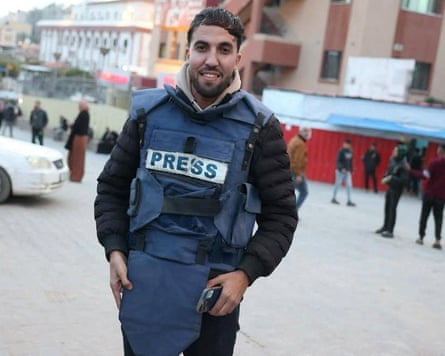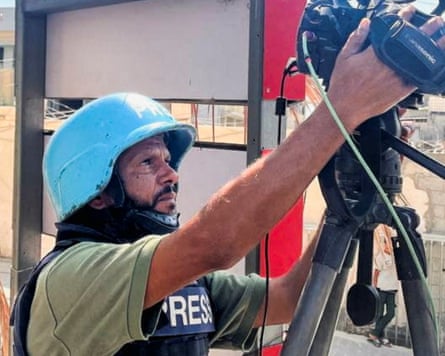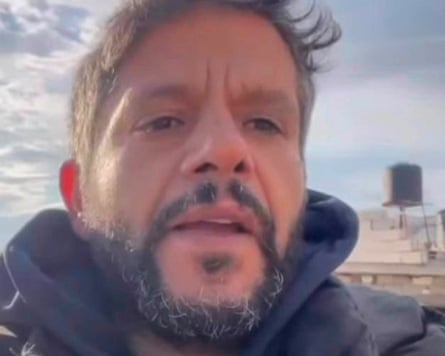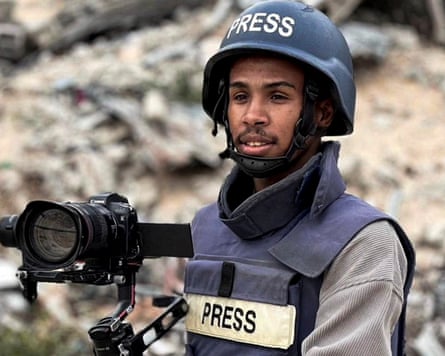‘He loved his work deeply’: the five Palestinian journalists killed in Gaza airstrike
Five Palestinian journalists were killed in an Israeli double-tap strike on Nasser hospital in southern Gaza on Monday.
Israel first struck a building at the hospital, killing Reuters journalist Hussam al-Masri and others. Journalists and rescue workers then ran to the scene to help their colleagues, when a second bomb hit the same spot, 15 minutes later.
The five journalists join their now more than 247 Palestinian colleagues who were killed during the war in Gaza over the last 22 months, according to UN statistics.
This is the deadliest conflict for journalists ever recorded, killing more journalists than both world wars, the Vietnam war, the Yugoslavia wars and the US war in Afghanistan combined.
The strike on Nasser hospital was captured by a live broadcast and showed unarmed medics and journalists holding up their hands to shield themselves just moments before they were killed.
The images of their deaths have provoked outrage across the globe and calls to protect Palestinian journalists while they are doing their jobs.
Here are their stories.
Moaz Abu Taha

Moaz Abu Taha was a 27-year-old freelance video journalist whose work had been published by Reuters, among other outlets.
Journalism had not been Abu Taha’s original career, but he felt compelled to begin filming during the Gaza war and soon found a passion in photography and video journalism. He could not afford a proper camera, so he filmed and photographed with his phone instead.
Over the last five months, as Gaza’s humanitarian crisis worsened and hunger began to spread throughout the strip, his family said Abu Taha began to work as a humanitarian. He focused on specific cases through his video reports, sending urgent appeals for sick children and the wounded who needed aid.
He had been preparing for his engagement when he was killed.
“Moaz was the youngest in our family, the spoiled one. He loved his work deeply, even though it hadn’t been his original career. He was very social and enjoyed making new friends everywhere,” said Adly Abu Taha, Moaz’s older brother.
Hussam al-Masri

Hussam al-Masri was a 48-year-old cameraman who worked with Reuters and was the father of two sons and two daughters.
Al-Masri started his career at a young age, helping his mother, who is also a journalist, to set up her a camera.
“He held his first camera in 1993 and from that year until now, almost 32 years, there was never a day without a camera by his side,” said Ezz al-Din al-Masri, Hussam’s mother.
He was known for his bravery in the field and his commitment to the story. His mother recounted how he was the last journalist to remain in Nasser hospital during Israel’s first invasion of Khan Younis in southern Gaza.
“To my surprise, he called me, saying he was still broadcasting from inside the hospital as the army surrounded them. I fought with him, demanding he leave immediately,” Ezz al-Din said.
Al-Masri continued his coverage throughout the war, despite his wife’s deteriorating health as she struggled to get treatment for cancer. In the days before his death, he had been seeking her evacuation from Gaza, where she could no longer receive the proper care. His friends and fellow journalists have kept up his appeal, advocating for her medical evacuation from the Palestinian territory.
“Hussam, even though he was nearing 49 years old, always carried the spirit of a child and an innocent, tender heart. I never felt that he could grow old or become an elder. I always treated him as my mischievous little boy,” Ezz al-Din said.
“But now, after his death, I was struck by the fact that he had aged without me realising it.”
Ahmed Abu Aziz

Ahmed Abu Aziz was a 29-year-old freelance journalist who worked for various outlets, such as Middle East Eye and Quds Feed.
He was described as “the journalist who never stopped” by his colleagues at Middle East Eye, and was known for his bravery. He travelled across the Gaza Strip to get his story, despite the danger it posed to him. He based himself in Nasser hospital, where he covered the impact of Israel’s attacks on people across Gaza.
Abu Aziz was acutely aware of the danger he was in as a journalist in Gaza. He lost two colleagues dear to him early on in the war, driving home how fragile his own sense of safety was. Writing a first-person piece for Middle East Eye last year, he said his work often made him feel lonely, but he would persist.
“It felt like I was all alone and the only one left on the ground as so many more of my colleagues were being killed,” Abu Aziz wrote.
Abu Aziz got married during the war, in July 2024. His wife, who found his body after the strike, described how much he supported and encouraged her to further her educational journey. She was studying for her PhD in law, and he his PhD in media.
“His dream was for us to earn our doctorates together. He always urged me to defend my dissertation no matter what, and he encouraged me endlessly. We were supposed to defend our theses together this year, but he left and I am alone, grieving his loss,” said Lurzan Abu Aziz, his 28-year-old wife.
Mohammad Salama

Mohammad Salama was a 24-year old photojournalist and camerman who worked with Al Jazeera.
He grew up just east of Khan Younis and knew he wanted to be a photojournalist from a young age, earning a diploma in photography and shadowing more established journalists. He joined Al Jazeera in Feburary 2024.
According to the news outlet, he was known for his professionalism, dedication, cheerful smile and light-hearted spirit.
In November, on his birthday, Salama got engaged to fellow journalist Hala Asfour. He and Asfour were excitedly planning their marriage day, to be held after a ceasefire in Gaza.
He was the 10th Al Jazeera journalist killed in the Gaza war.
Mariam Dagga

Mariam Abu Dagga was a 33-year-old photojournalist and mother of a 13-year-old boy, Ghaith. She studied journalism in university and began working as a journalist in 2015, covering major events in Gaza such as the 2018 “great march of return”.
During the Gaza war, she began working for the Associated Press and Independent Arabia, primarily covering humanitarian issues.
Her photography highlighted the human suffering in Gaza, with pictures depicting starving children and people grieving their loved ones after Israeli strikes. Her last report for the Associated Press covered the plight of malnourished children in Nasser hospital, where she was killed on Monday.
Fellow journalists who knew her said Dagga was always ready to work, even in dangerous areas of Gaza, in order to get the story out to the rest of the world. Despite her work ethic, friends and family said she was overwhelmingly kind and was an inspiration to those around her.
“Mariam loved her work, was passionate about it, very fast in covering events and never stopped documenting everything. She was very kind and deeply cared about her family. She loved everyone and everything,” said Siddiq Abu Dagga, Mariam’s brother.
Outside of work, Dagga was a dedicated mother, speaking to her son Ghaith daily. She left behind a letter for her son, in which she told him how proud of him she was.
“You are my love, my heart, my support, my soul and my son whom I am always proud of,” Dagga wrote in a letter to Ghaith before she was killed.